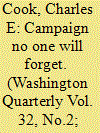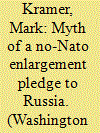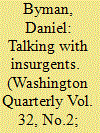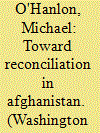|
|
|
Sort Order |
|
|
|
Items / Page
|
|
|
|
|
|
|
| Srl | Item |
| 1 |
ID:
087097


|
|
|
|
|
| Publication |
2009.
|
| Summary/Abstract |
It would seem to be impossible not to recognize the historical significance and symbolism that Barack Obama's election represents, regardless of whether someone supported Obama, John McCain, Hillary Clinton, or any of the other thirteen contenders for the presidency. Just 45 years after Dr. Martin Luther King's ''I Have a Dream'' speech and Birmingham Public Service Commissioner Bull Connor directed fire hoses to be aimed at civil rights demonstrators, an African-American was elected president of the United States. No matter how Obama fares as president, this is a remarkable milestone in U.S. history.
|
|
|
|
|
|
|
|
|
|
|
|
|
|
|
|
| 2 |
ID:
087091


|
|
|
|
|
| Publication |
2009.
|
| Summary/Abstract |
After a slow start, the U.S. military has made remarkable strides in adapting to irregular warfare in Afghanistan and Iraq, and is beginning to institutionalize those adaptations. Recent Department of Defense (DOD) directives and field manuals have elevated stability operations and counterinsurgency to the same level of importance as conventional military offensive and defensive operations.
|
|
|
|
|
|
|
|
|
|
|
|
|
|
|
|
| 3 |
ID:
087092


|
|
|
|
|
| Publication |
2009.
|
| Summary/Abstract |
About a month before the 60th anniversary of the Universal Declaration of Human Rights (UDHR), the United States elected its first African-American president, Barack Obama. This historic event, a fitting milestone, brings to life that declaration, which human rights activists and legal scholars regard as the sacred text. Obama's election fulfills a dream of the U.S. civil rights movement, a struggle that relied as much on the UDHR as on the courage of the men and women who for decades fought to make the United States a ''more perfect union.'' For human rights defenders around the world, its significance cannot be overstated.
|
|
|
|
|
|
|
|
|
|
|
|
|
|
|
|
| 4 |
ID:
087086


|
|
|
| 5 |
ID:
087096


|
|
|
|
|
| Publication |
2009.
|
| Summary/Abstract |
One of the major contributions of Barack Obama's presidential campaign during 2007-08 was his political success in shifting the focus of the U.S. foreign policy debate away from Iraq and toward Afghanistan. The reversal of fortunes in the two major wars that President George W. Bush had embarked upon during his tenure (a steady improvement in the military situation in Iraq during the last two years of the Bush administration and the rapidly deteriorating one in Afghanistan) helped Obama to effectively navigate the foreign policy doldrums that normally sink the campaigns of Democratic candidates in U.S. presidential elections.
|
|
|
|
|
|
|
|
|
|
|
|
|
|
|
|
| 6 |
ID:
087088


|
|
|
|
|
| Publication |
2009.
|
| Summary/Abstract |
In the latter half of the 1990s, as the North Atlantic Treaty Organization (NATO) was preparing to expand its membership for the first time since the admission of Spain in 1982, Russian officials claimed that the entry of former Warsaw Pact countries into NATO would violate a solemn ''pledge'' made by the governments of West Germany and the United States in 1990 not to bring any former Communist states into the alliance.1 Anatolii Adamishin, who was Soviet deputy foreign minister in 1990, claimed in 1997 that ''we were told during the German reunification process that NATO would not expand.'' Other former Soviet officials, including Mikhail Gorbachev, made similar assertions in 1996-1997
|
|
|
|
|
|
|
|
|
|
|
|
|
|
|
|
| 7 |
ID:
087089


|
|
|
|
|
| Publication |
2009.
|
| Summary/Abstract |
Two countries, ''both alike in dignity,'' have for too long been the Capulets and Montagues of our days. Grudges like the 1979 hostage crisis and the U.S. role in the overthrow of the popular Mossadeq government in 1953, ill feelings stemming from the clerical regime's nuclear program and help for organizations like Hezbollah, and the Bush administration's ham-fisted policy of ''regime change'' have combined to make the Islamic Republic of Iran one of the most intractable challenges facing the United States.
|
|
|
|
|
|
|
|
|
|
|
|
|
|
|
|
| 8 |
ID:
087090


|
|
|
|
|
| Publication |
2009.
|
| Summary/Abstract |
As the historic first 100 days of President Barack Obama's administration fly by, he faces a tsunami of advice on the key priorities he should pursue over the next four years. Ranging from energy independence and national health care reform to improving America's image with the Islamic world and revamping our foreign assistance structure, the president must decide where to focus his scarce time, resources, and political capital. One initiative he should strongly consider this year is calling upon the U.S. Senate to once again take up the ratification of the Comprehensive Test Ban Treaty (CTBT) to outlaw nuclear testing around the world, even though the initiative failed in October 1999 by a 51-48 vote.
|
|
|
|
|
|
|
|
|
|
|
|
|
|
|
|
| 9 |
ID:
087087


|
|
|
|
|
| Publication |
2009.
|
| Summary/Abstract |
Every four years, the National Intelligence Council (NIC) publishes an unclassified report projecting global trends over the next fifteen years. The intent is to help incoming decisionmakers lift their sights above the here-and-now, focusing on longer-term trends likely to shape the strategic future of the United States.
|
|
|
|
|
|
|
|
|
|
|
|
|
|
|
|
| 10 |
ID:
087093


|
|
|
|
|
| Publication |
2009.
|
| Summary/Abstract |
Talking with insurgents is often a necessary first step toward defeating them or reaching an acceptable compromise. These talks must often be done even as insurgents shoot at U.S. soldiers, and they in turn, shoot at them. Iraq represents perhaps the most recent and notable case where diplomacy triumphed: U.S. efforts to reach out to Iraqi Sunni tribal groups, many of which were linked to various insurgent organizations, eventually paid vast dividends as these tribes ''flipped'' and began to work with the coalition against al Qaeda in Iraq. In Shi'a areas, both direct and indirect talks helped facilitate a ceasefire that has done much to keep Iraq's fragile peace intact.
|
|
|
|
|
|
|
|
|
|
|
|
|
|
|
|
| 11 |
ID:
087095


|
|
|
|
|
| Publication |
2009.
|
| Summary/Abstract |
Since the September 11, 2001 attacks, the United States has sought to help Pakistan transform itself into a stable, prosperous, and democratic state that supports U.S. interests in the region, is capable of undermining Islamist militancy inside and outside its borders, commits to a secure Afghanistan, and actively works to mitigate prospects for further nuclear proliferation. Washington has also hoped that Pakistan, along with India, would continue to sustain the beleaguered peace process to minimize the odds of a future military crisis between them. Between fiscal years 2002 and 2008, the United States has spent more than $11.2 billion, presumably to further these goals. The FY 2009 budget request includes another $1.2 billion.
|
|
|
|
|
|
|
|
|
|
|
|
|
|
|
|
| 12 |
ID:
087094


|
|
|
|
|
| Publication |
2009.
|
| Summary/Abstract |
How can we make sense of where the United States is in Afghanistan today? A poor country, wracked by 30 years of civil war, finds itself at the mercy of insurgents, terrorists, and narco-traffickers. NATO's economy-of-force operation there has attempted to help build a nation with very few resources. Yet, overall levels of violence remain relatively modest by comparison with other violent lands such as the Congo, Iraq, and even Mexico. Economic growth is significant and certain quality of life indicators are improving, though from a very low base.
|
|
|
|
|
|
|
|
|
|
|
|
|
|
|
|
|
|
|
|
|